The Mysterious Side of Each Myers-Briggs® Personality Type
Each of us has a little mystery inside, whether others realize it or not. Some of us keep a lot of inner feeling and passion inside while others have a complex inner world of logical principles and connections inside. Every person has a million nuances that make them unique; some related to personality and some not. Today we’re taking a look at why each of the 16 Myers-Briggs® is mysterious. Let’s get started!
Not sure what your personality type is? Take our new personality questionnaire here. Or you can take the official MBTI® here.

Table of contents
Estimated reading time: 19 minutes
The Mysterious Side of Each Myers-Briggs® Personality Type
The ENFP
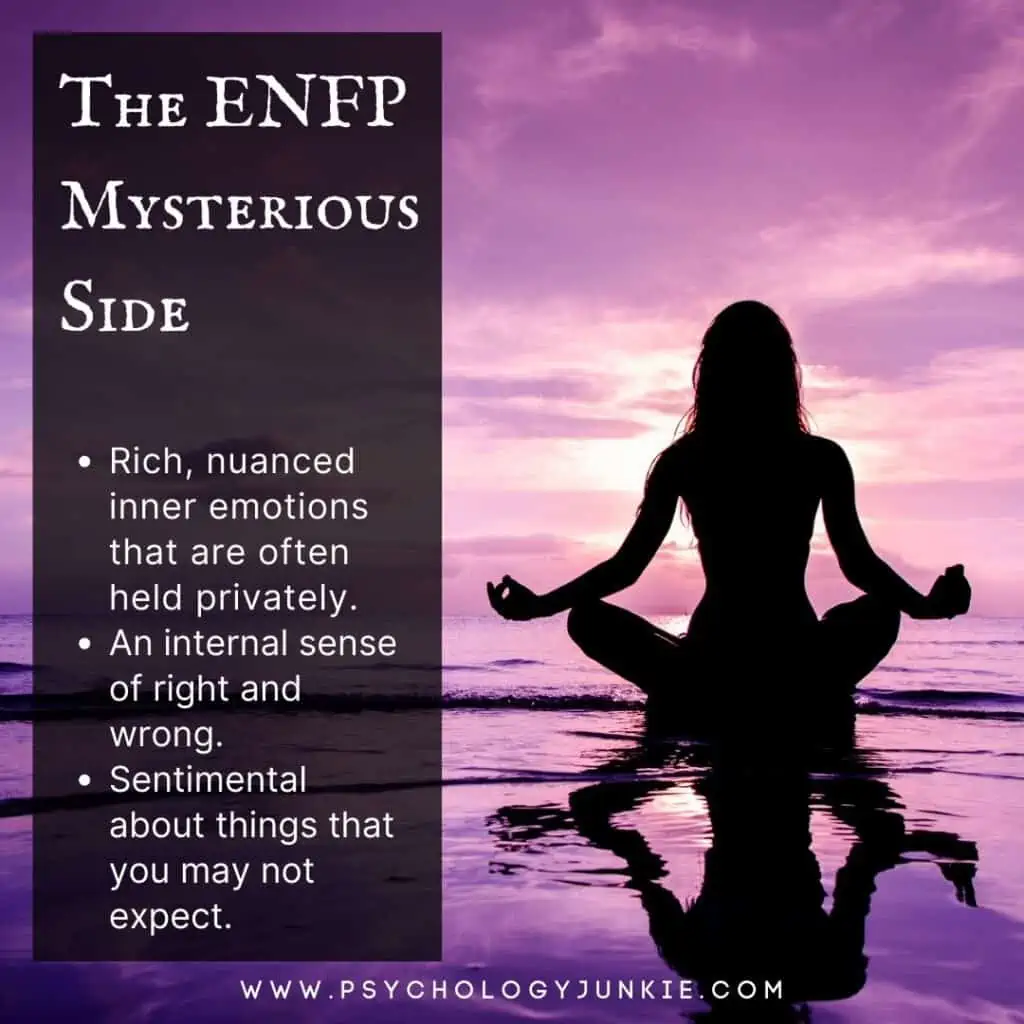
To the outside world, ENFPs can seem like fountains of energy and inspiration—brimming with ideas, cracking jokes, hyping people up. But if you think that’s all there is, you’re missing the best part.
Underneath the spontaneity and spark, ENFPs have a private world of deep feelings and insights. Their journals? Probably packed with musings on morality, grief, love, and the meaning of life. There’s depth and complexity that’s missed in the stereotypes or the surface-level interactions.
Sure, they might wear their hearts on their sleeves in some ways—but not all ways. Their most vulnerable thoughts? Those stay hidden, shared only with a select few.
People often assume ENFPs are open books. But spend enough time with one and you realize: that was just the preface.
Read This Next: 24 Signs That You’re an ENFP, The Visionary Personality Type
The ENTP
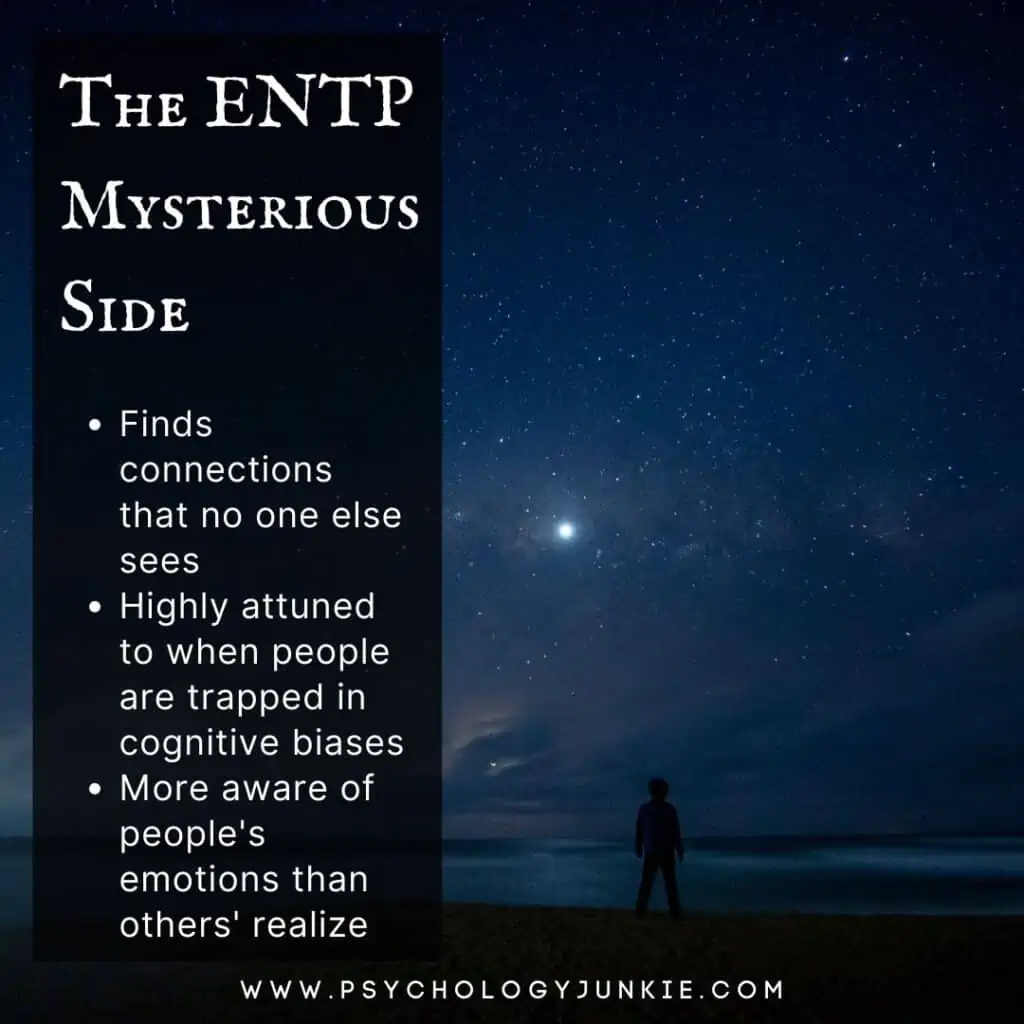
Quick-witted and full of ideas, ENTPs are the brainstormers of the personality world. They love tossing out theories, connecting the dots, and challenging the limits of what’s possible.
But don’t let the chatter fool you—there’s depth behind the banter.
ENTPs are relentlessly curious. They’re the kind of people who will stay up until 3 AM unraveling the implications of a scientific theory or wondering why society works the way it does. They aren’t just throwing spaghetti at the wall—they’re seeing the hidden patterns in how the spaghetti lands.
They can seem bold, brash, even argumentative. But many ENTPs are surprisingly tuned in to the emotional vibe of a room. They notice awkward pauses. They care when someone’s hurting. And yes—they can get self-conscious when they’ve said the wrong thing (even if they pretend they don’t care).
Read This Next: 10 Things You Should Never Say to an ENTP
The INFP
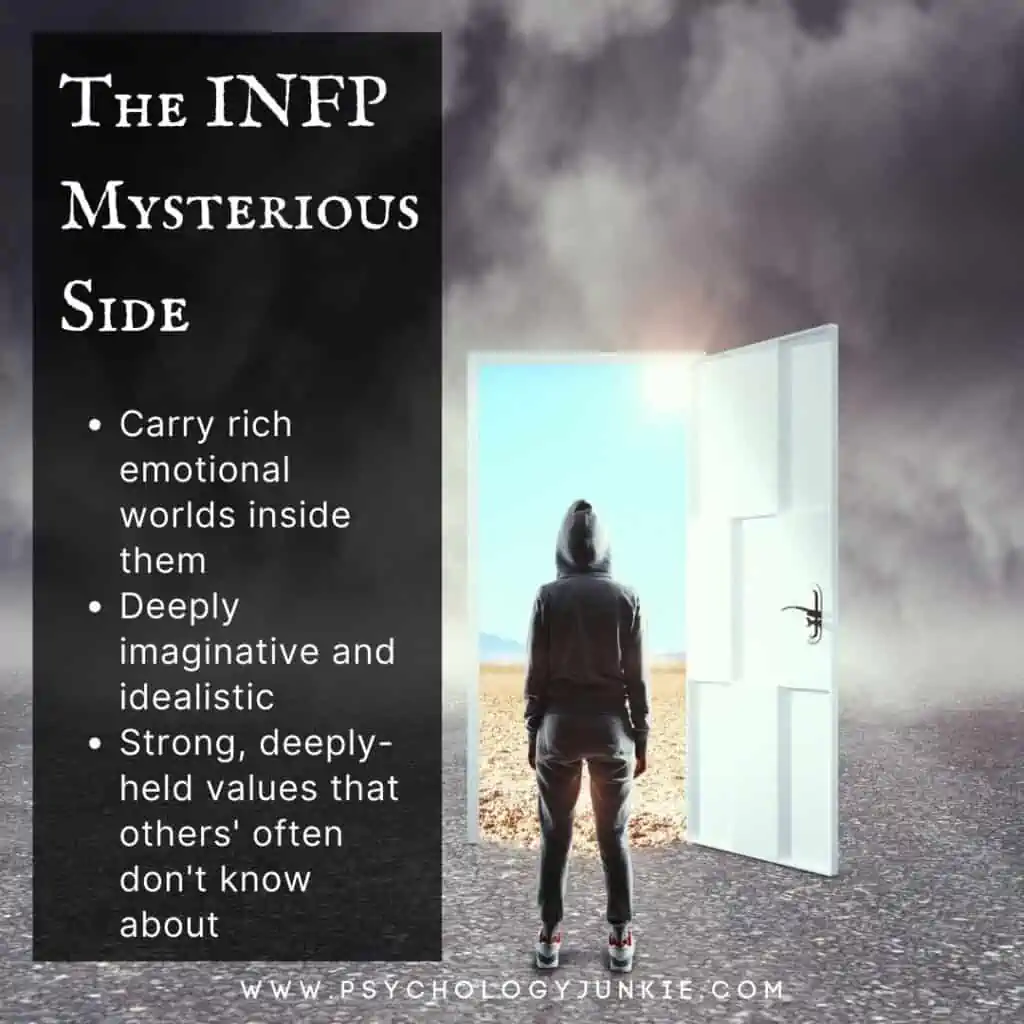
INFPs often have an aura of mystery. They might be quiet, reserved, or just lost in thought—but don’t mistake that for emptiness.
Inside, their minds are alive with imagination and emotion. They’re dreamers, idealists, artists at heart—even if they’ve never touched a paintbrush. They care deeply about people, about justice, about meaning. Not just surviving, but living with purpose.
You might catch glimpses of that inner world in their poetry, in the playlists they curate, or in a comment that cuts straight to the soul. But to really know an INFP? You have to earn their trust. They don’t just hand their thoughts to anyone.
And even then, you’ll probably still be surprised by how much more is there.
Read This Next: INFPs and Their Compatibility with Every Myers-Briggs® Personality Type
The INTP
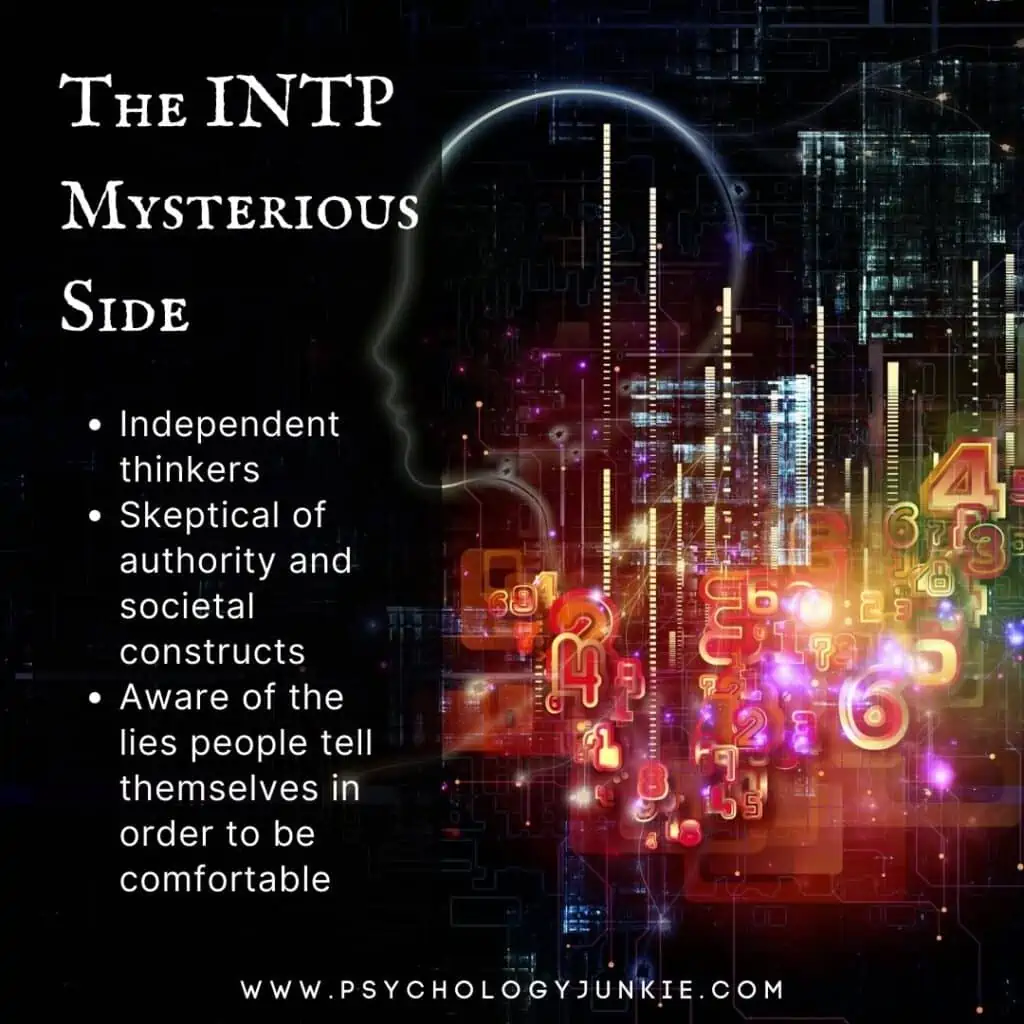
INTPs are often underestimated. People see the quirky humor, the messy desk, the scattered energy—and assume that’s all there is.
But under the hood? These types are mental powerhouses.
They love picking apart complex problems that leave others stumped. The more abstract and puzzling, the better. INTPs aren’t afraid of mental mazes—they live in them. Give them a blank canvas and they’ll paint possibilities no one else even considered.
Socially, they can seem hard to read. They may go quiet in tense situations or retreat when emotions run high. That’s not because they don’t care—it’s because they do. Intense emotional dynamics can feel overwhelming. They need space. Quiet. Freedom to process.
Inside the mind of an INTP is a world built on logic, laced with imagination, and governed by independent thought.
Read This Next: A Look at the INTP Leader
The ENFJ
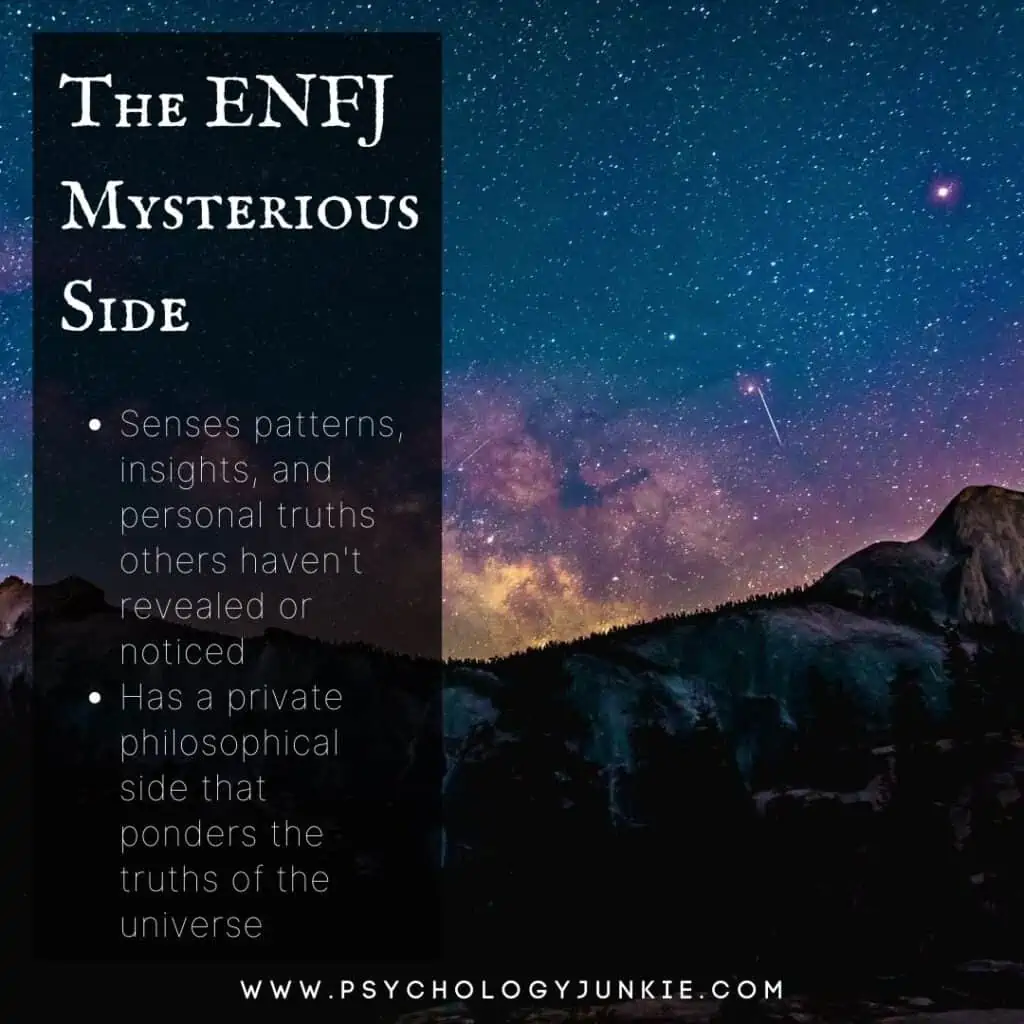
ENFJs are often seen as the heart of a group—the inspirer, the motivator, the one who lifts everyone else up.
They have a gift for reading people. Emotions, body language, unsaid tensions—they pick up on all of it. They know how to bring people together, how to make someone feel seen, how to guide conversations toward meaning and connection.
But underneath that polished, people-savvy exterior is a deeply sensitive soul.
ENFJs often absorb the emotional energy of the people around them. They feel things deeply. They care a lot. And sometimes that care weighs heavy. They might seem confident and self-assured, but they often need affirmation—some reminder that they’re doing okay, that their efforts matter.
They also crave deep, soul-level connection. Not just casual friendship. Not just surface niceness. Real, honest-to-God connection.
And when they get time alone, they’re not just recharging—they’re reflecting. Asking big questions. Imagining possibilities. Tapping into a world of symbols, meaning, and hope.
Read This Next: The ENFJ Personality Type and the Enneagram
The ENTJ
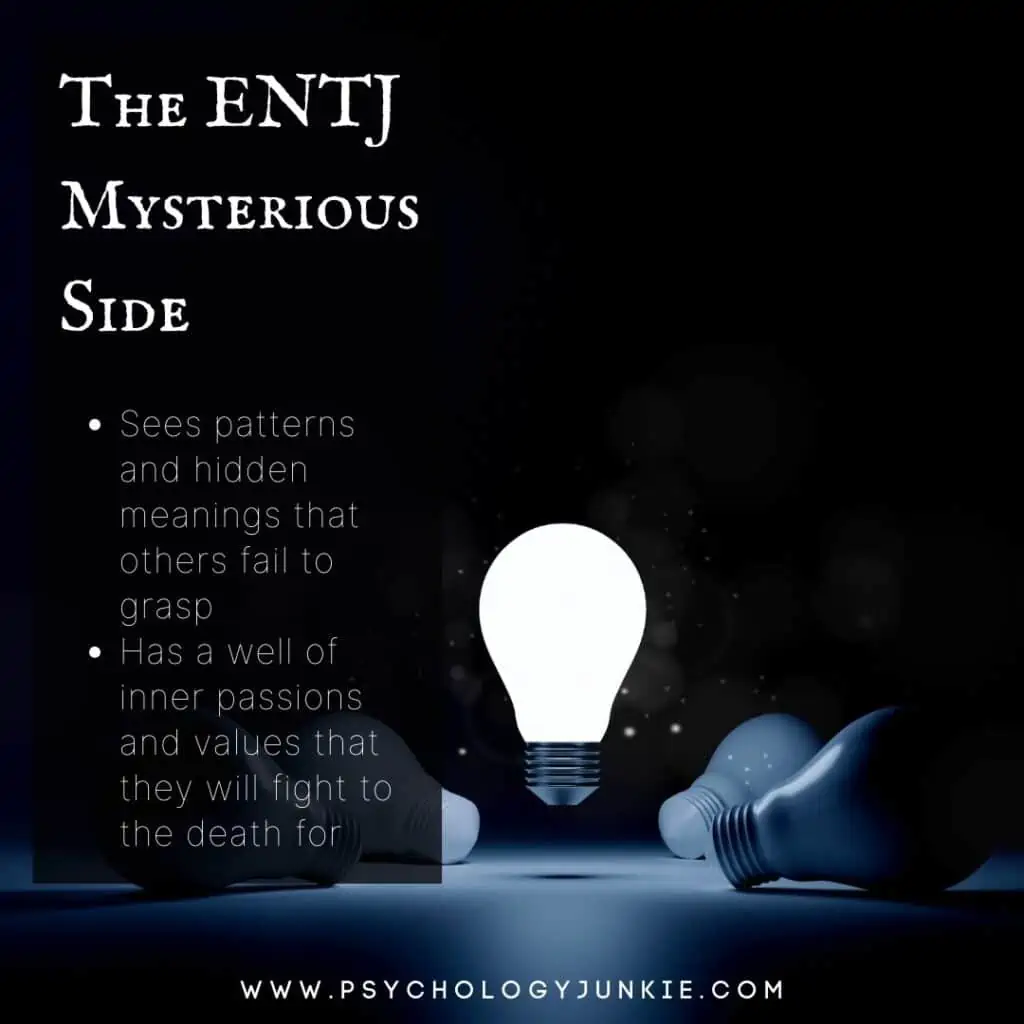
Bold. Decisive. Strategic. ENTJs are the type you want leading the charge into chaos. They see the big picture, organize the chaos, and tell everyone exactly how to fix it.
They’re often drawn to leadership—yes, because they’re good at it. But also because they hate inefficiency. If there’s a better way to do something, they want to find it, implement it, and get it done.
But here’s what people often miss:
ENTJs aren’t just cold, calculating powerhouses. They’re intuitives. That means they have a philosophical, often idealistic side that’s looking for meaning behind the motion.
They want life to matter.
And while they can come across as blunt or intimidating, many ENTJs are actually deeply passionate about causes that stir their hearts. They’ll fight for justice, stand up for the underdog, or donate time and money to a cause they believe in.
Underneath the armor? A deeply ethical human being with a whole lot of fire.
Read This Next: 10 Things You Should Never Say to an ENTJ
The INFJ
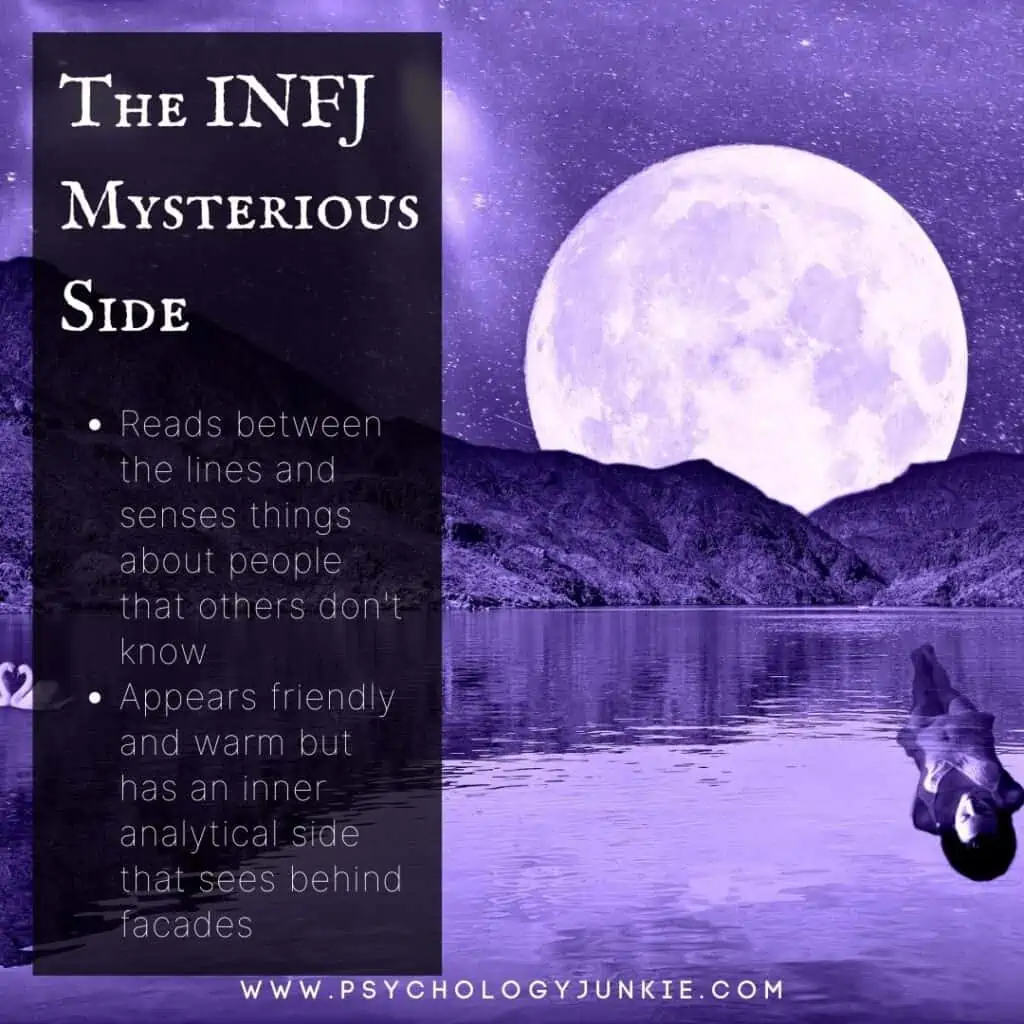
INFJs are one of the rarest types—and it shows. They often feel out of place, like they’re walking through life tuned to a different frequency.
They’re deeply introspective, always searching for meaning. Symbolism, psychology, philosophy—these are their playgrounds. They’re not just interested in how things are, but why they are. What does it all mean? Where is it all going?
They’re also incredibly empathetic. They often know when someone’s hurting—sometimes before the person knows it themselves. They’ll quietly reach out, offer support, and carry emotional weight that isn’t theirs to carry.
But that kind of emotional radar can get overwhelming. INFJs often need a lot of solitude just to sort out what’s theirs and what belongs to everyone else.
They might seem warm and approachable (and they are), but there’s also a depth and mystery to them. A private world they only open up to a trusted few.
Read This Next: INFJ Personality Profile
The INTJ
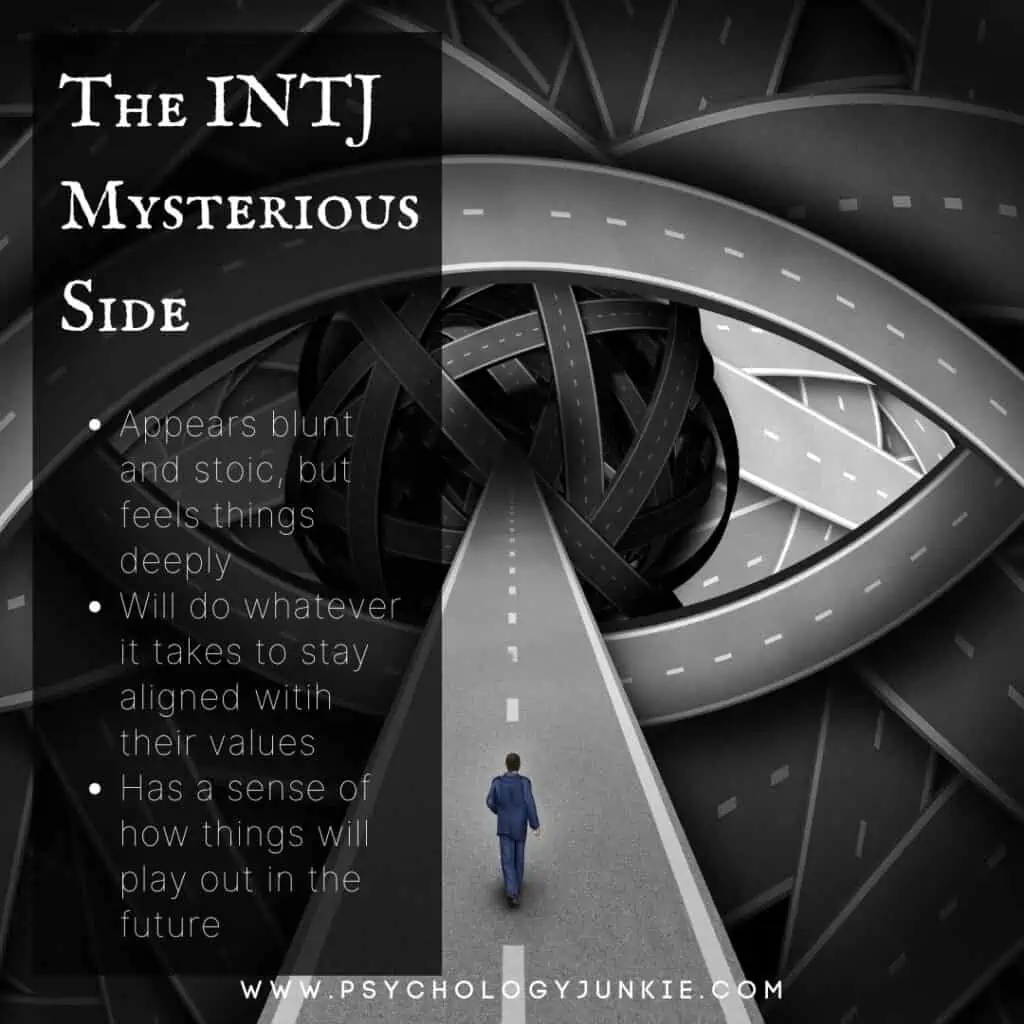
INTJs are the strategists of the personality world. Focused, independent, and future-minded, they have a knack for turning abstract visions into detailed, realistic plans.
They’re often seen as reserved or even aloof—but that’s just because their minds are usually three steps ahead of the present moment. While others are reacting, INTJs are already planning, solving, and refining.
They can seem like all logic and productivity—but they’re also deeply imaginative.
Their intuition is dominant, which means they spend a lot of time in their inner world. There, they’re connecting symbols, insights, and patterns—often experiencing flashes of clarity that seem to come out of nowhere.
They don’t share these insights easily, though. What’s going on inside is often too complex or sacred to explain on the fly.
And while INTJs may not always seem emotional, they are driven by core values. When they believe in something, they’ll fight for it. Quietly. Strategically. Relentlessly.
Read This Next: INTJ Personality Profile
The ESFP
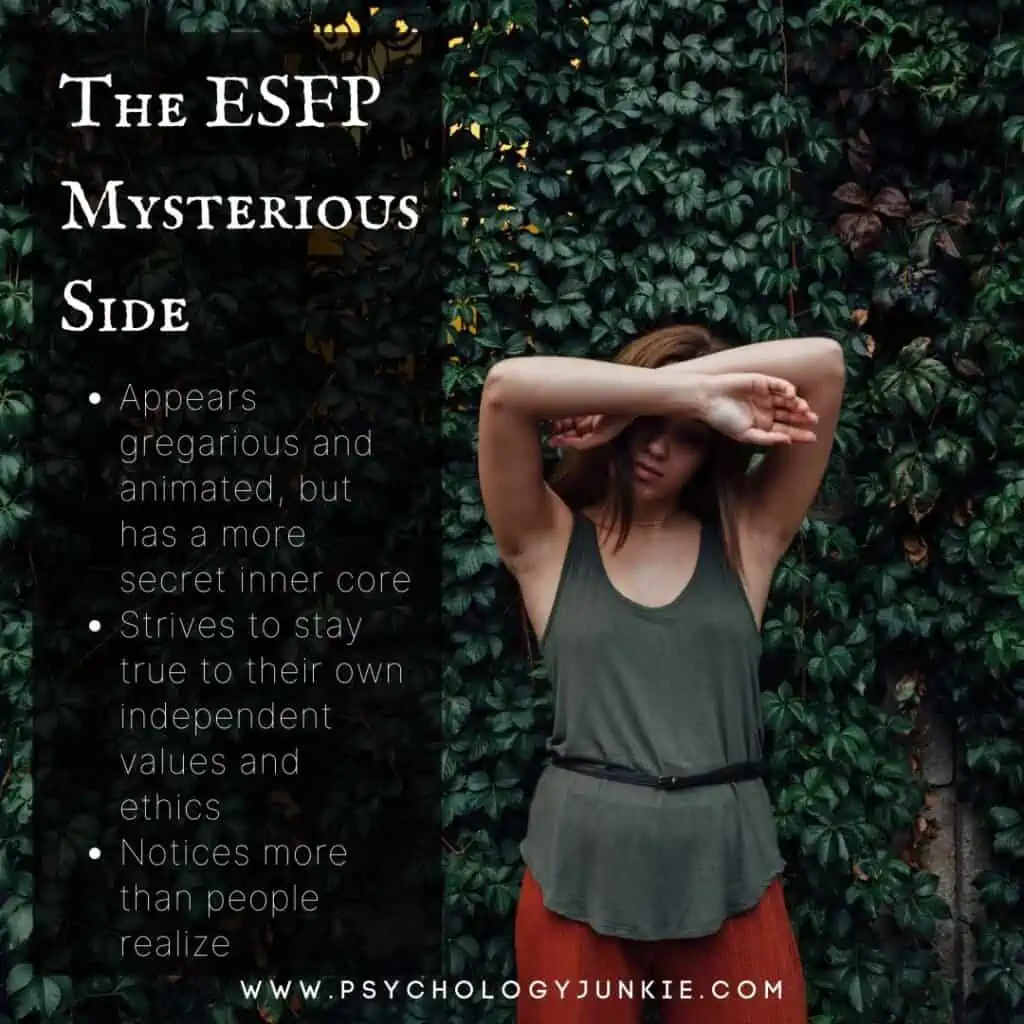
ESFPs light up a room. They’re the ones cracking jokes, rallying friends, and turning the most boring Tuesday into a party. They love experiences—real, raw, full-sensory moments that make them feel alive.
But don’t mistake their sparkle for shallowness.
Underneath the fun-loving energy is a surprisingly sensitive soul. ESFPs care—deeply—about authenticity. About living a life that’s true to who they are. About protecting their inner values, even if they don’t talk about them openly.
They’re often underestimated. People assume they’re all fun and flash. But behind the curtain, ESFPs can be deeply thoughtful, expressive, and emotionally tuned-in.
You’ll find their depth in their playlists, their performances, their late-night heart-to-hearts. There’s poetry in their timing. Wisdom in their spontaneity.
The ESTP
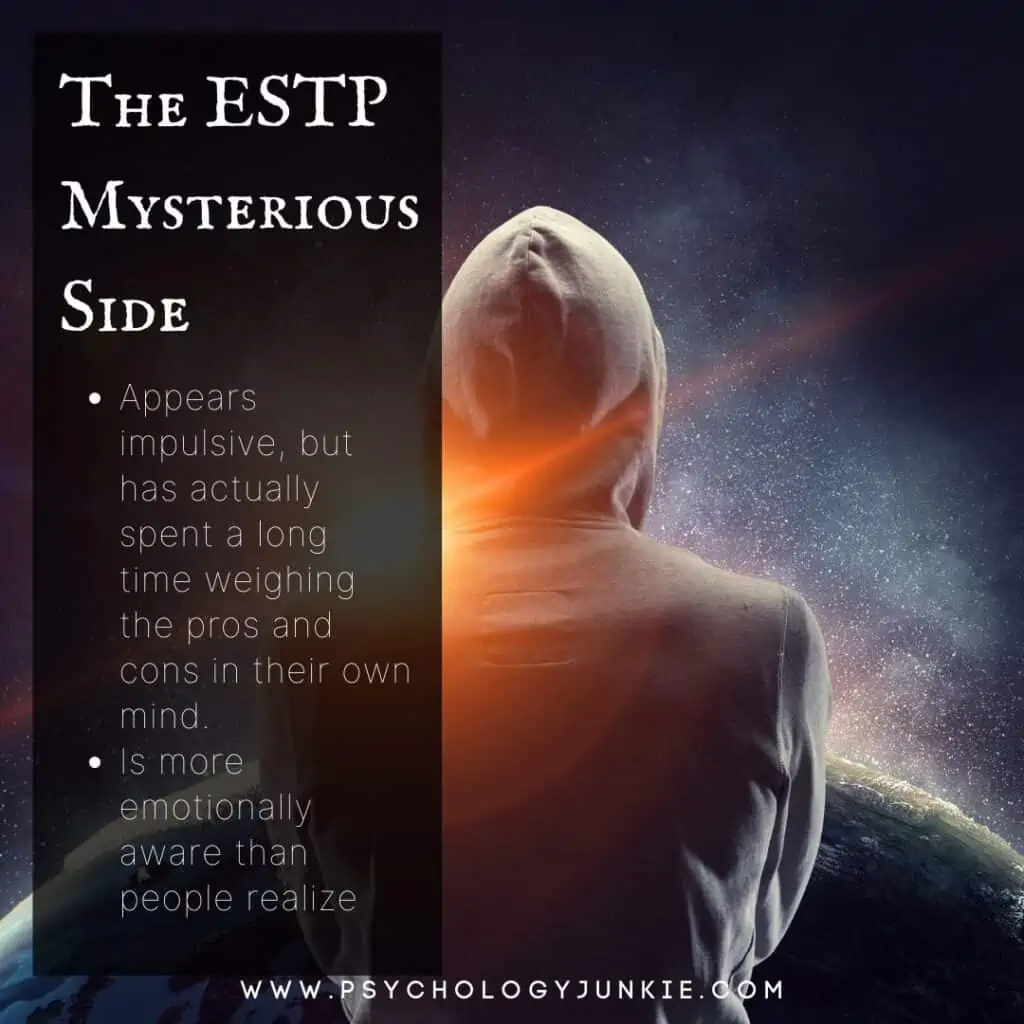
ESTPs are pure energy. They’re the ones jumping into action, making fast decisions, and handling chaos with startling grace.
Need someone to think on their feet? Call an ESTP. They’re wired for the moment.
But there’s more to them than split-second reflexes and adventurous plans. ESTPs are sharp. Analytical. Constantly scanning for leverage points and better ways to win the game—whatever that game may be.
While they may seem impulsive, there’s often a calculated mind at work behind the scenes. One that weighs risks, reads people, and stays grounded in reality.
And yes—they care. ESTPs can be surprisingly sensitive to other people’s moods. They often shift the energy in a room without even trying, using humor or presence to diffuse tension or hype up the vibe.
They won’t always say how they feel—but they’ll show it. And if you’re in their circle, you’ll know they’ve got your back.
The ISFP
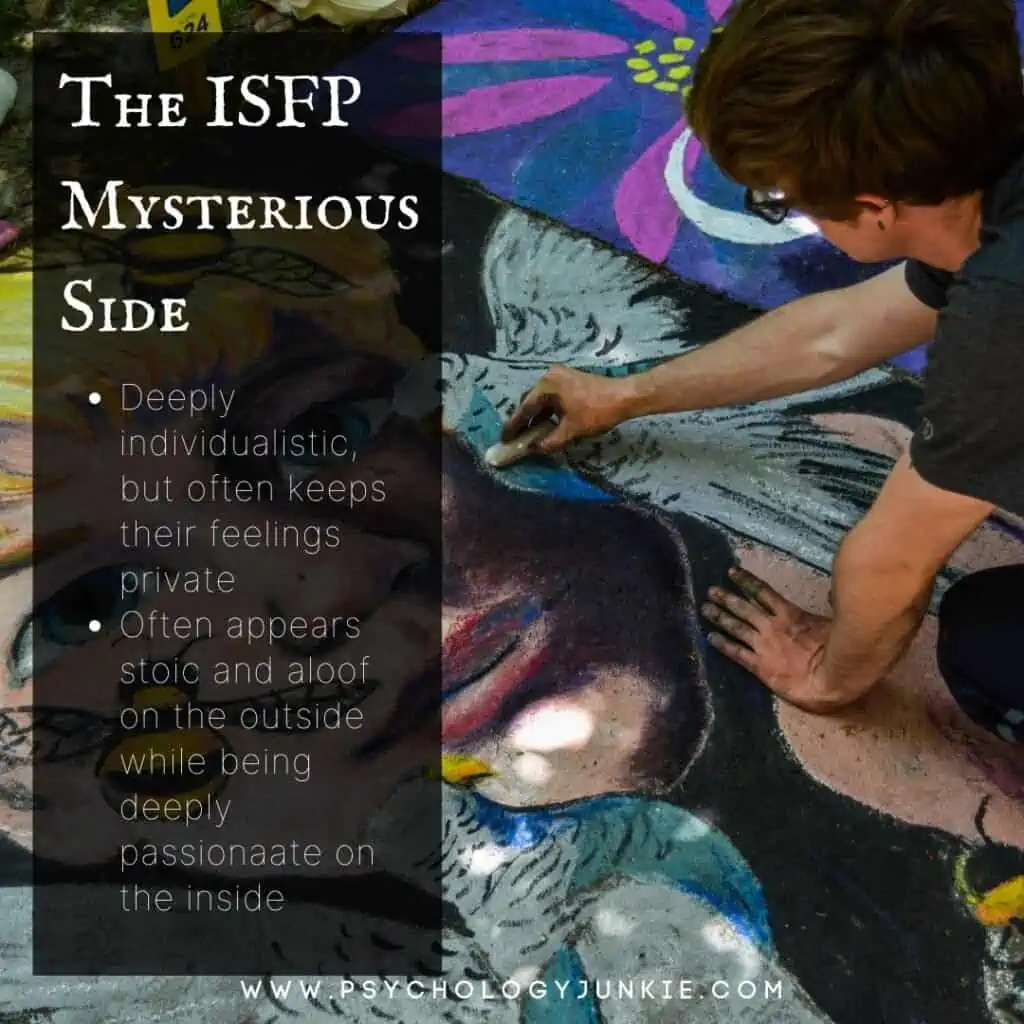
ISFPs are likely one of the most mysterious personality types of the 16 that exist. They rarely show their feelings on the outside, but there are a vast array of rich and nuanced emotions held deeply beneath the surface.
These types are individualists in every sense of the word, and they often have a strong creative streak. Even if they’re not holding a paintbrush or writing poetry, they move through life with creative sensitivity. They notice things—colors, moments, emotions—that others miss entirely.
ISFPs value authenticity above all else. They’re not about putting on a show or following the crowd. They want to live a life that aligns with their values—even if it looks different from what everyone else is doing.
They’re also deeply observant. Quietly watching. Taking everything in. And while they might not say much, their perspectives are often profound, ahead of the curve, and refreshingly unique.
People are often drawn to their quiet magnetism—and left wondering what’s really going on behind those thoughtful eyes.
Read This Next: 24 Signs That You’re an ISFP, the Virtuoso Personality Type
The ISTP
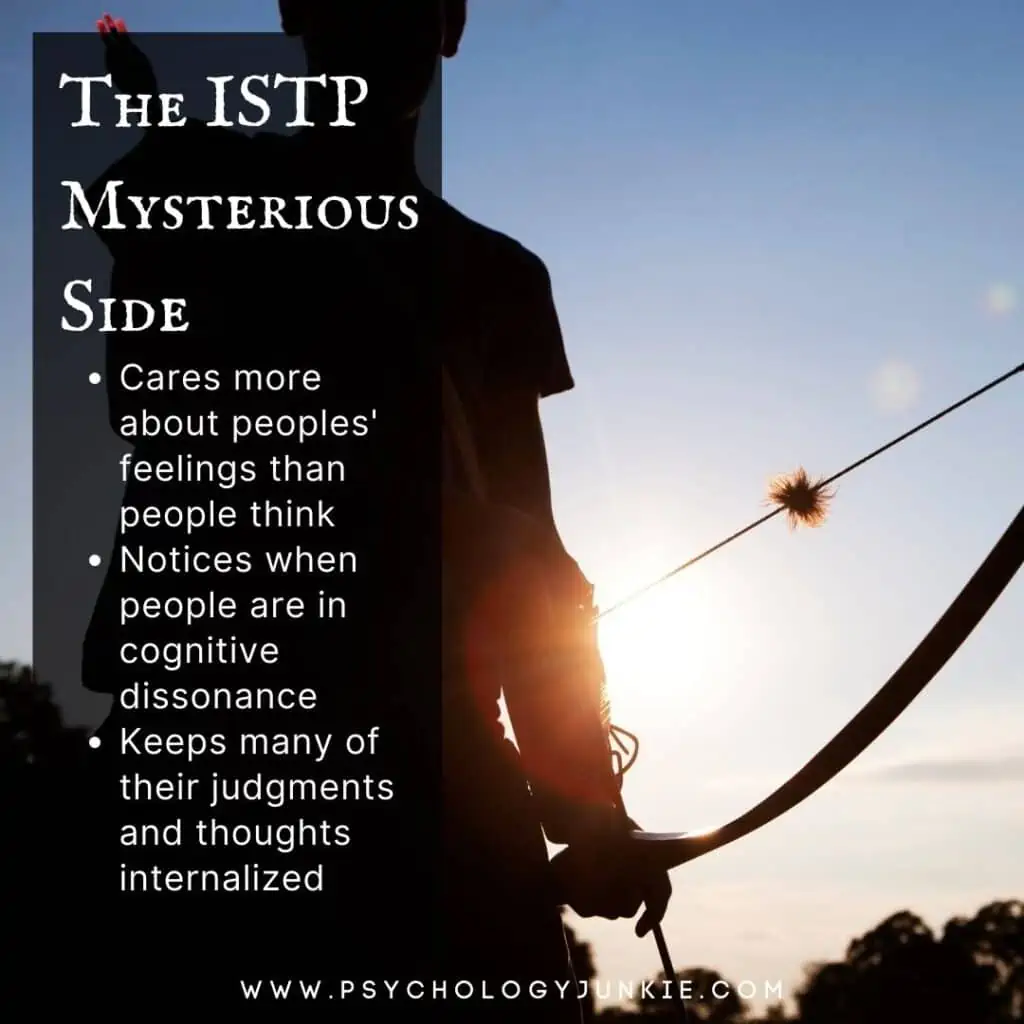
ISTPs are often the wildcard in the room. Cool, observant, and quick on their feet, they give off a vibe that says, “I’ve got this”—even when everything is falling apart.
They’re pragmatic. Tactical. Hyper-focused on what works. But they’re also private. Most ISTPs don’t see the point in sharing their every thought—and they definitely don’t do emotional oversharing.
And yet, they’re not unfeeling.
They just guard their inner world like a vault. You have to earn your way in. When ISTPs care, they care quietly—but fiercely.
They also have a highly logical, analytical mind. They’re quick to spot flaws in reasoning, loopholes in plans, or emotional manipulation in conversations. If you’re pretending or exaggerating, they’ll probably catch it—and they won’t be impressed.
To others, ISTPs can seem like they see everything… while revealing next to nothing.
Read This Next: Understanding ISTP Thinking
The ESFJ
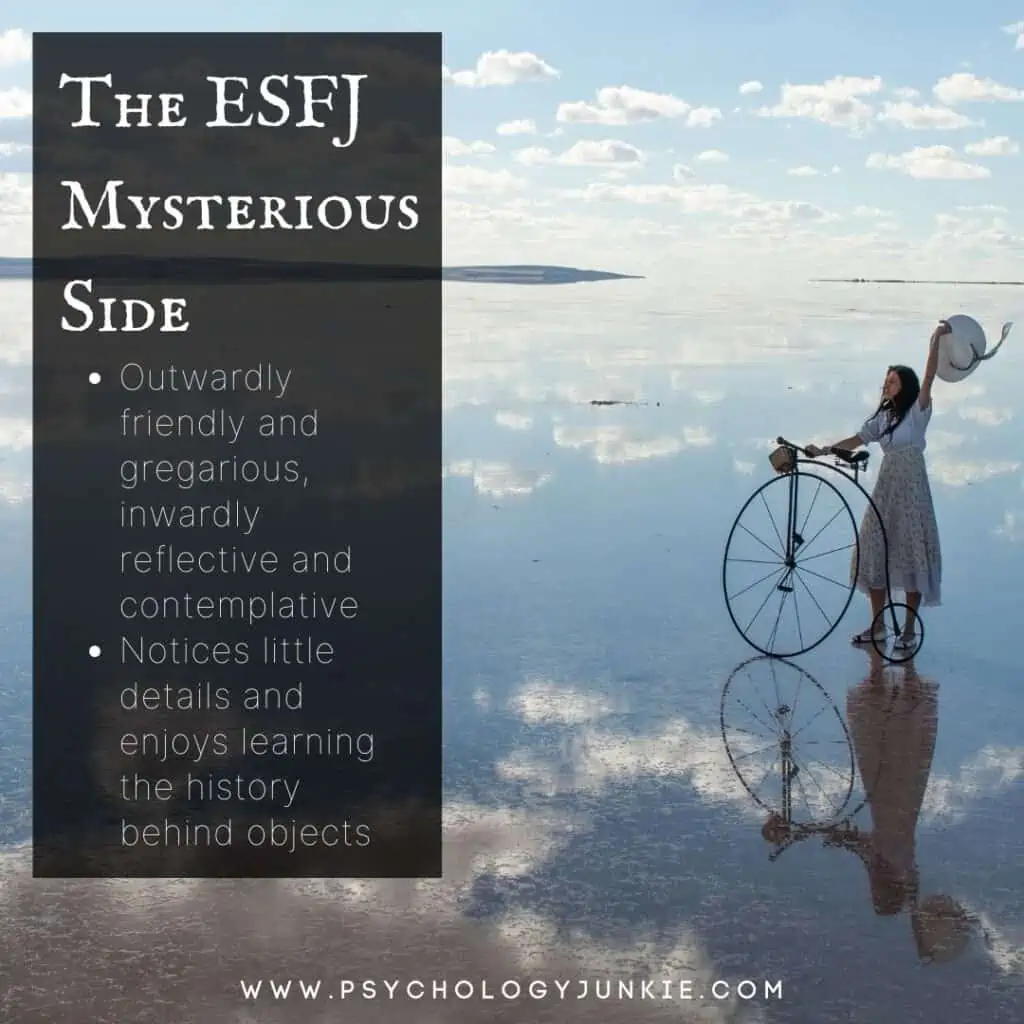
ESFJs are some of the most expressive and group-oriented people you’ll ever meet. They’re quick to show their love and affection for others, and they’re always looking for ways to make those close to them happy.
If someone needs a meal, a hug, a ride, or just someone to notice they’re having a hard day—the ESFJ is already there, probably with snacks.
But underneath all that caretaking is someone with a lot more going on.
ESFJs are deeply reflective. They see connections in everything—between people, between memories, between generations. Objects hold meaning. Traditions matter. Life isn’t just a checklist to them—it’s a collection of memories, and they’re always trying to make sure those memories are revered and revisited.
They may seem like cheerful hosts on the outside, but on the inside, they’re storytellers. Meaning-makers. Sentimental souls with a profound understanding of what makes people feel seen and valued.
Read This Next: 7 Things That ESFJs Experience as Children
The ESTJ
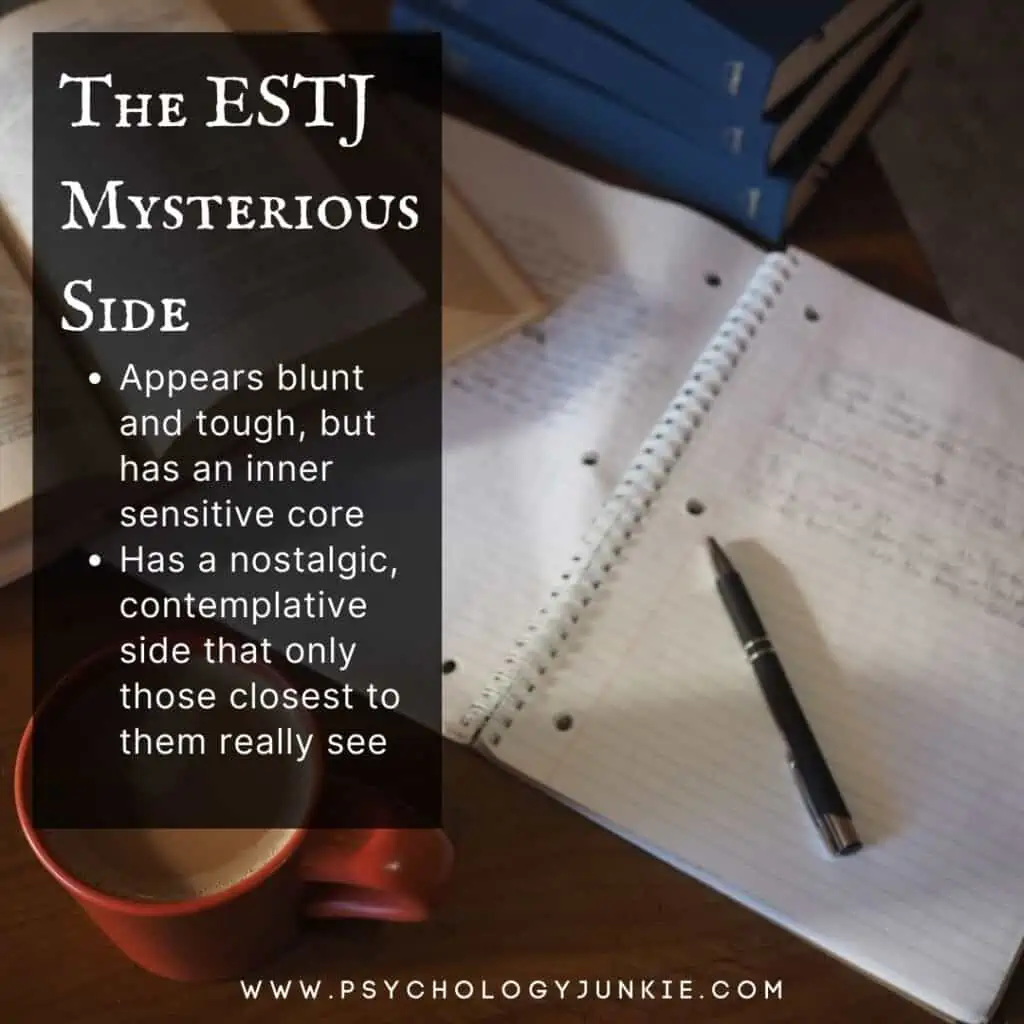
ESTJs are the engines of the world. Efficient, driven, no-nonsense—they’re the ones getting things done while everyone else is still talking about it.
They show up. They follow through. They hold the line.
People often see the commanding presence, the directness, the practicality—and assume that’s the whole picture. But ESTJs have a more introspective side than most people realize.
They care deeply about right and wrong. About legacy. About doing what’s honorable, even when it’s hard. And in quiet moments, they reflect on the past with a surprising level of warmth and sensitivity.
They don’t always express emotion in a touchy-feely way—but they feel it. Strongly. And the people and values they love? They’ll protect them with everything they’ve got.
The ISFJ
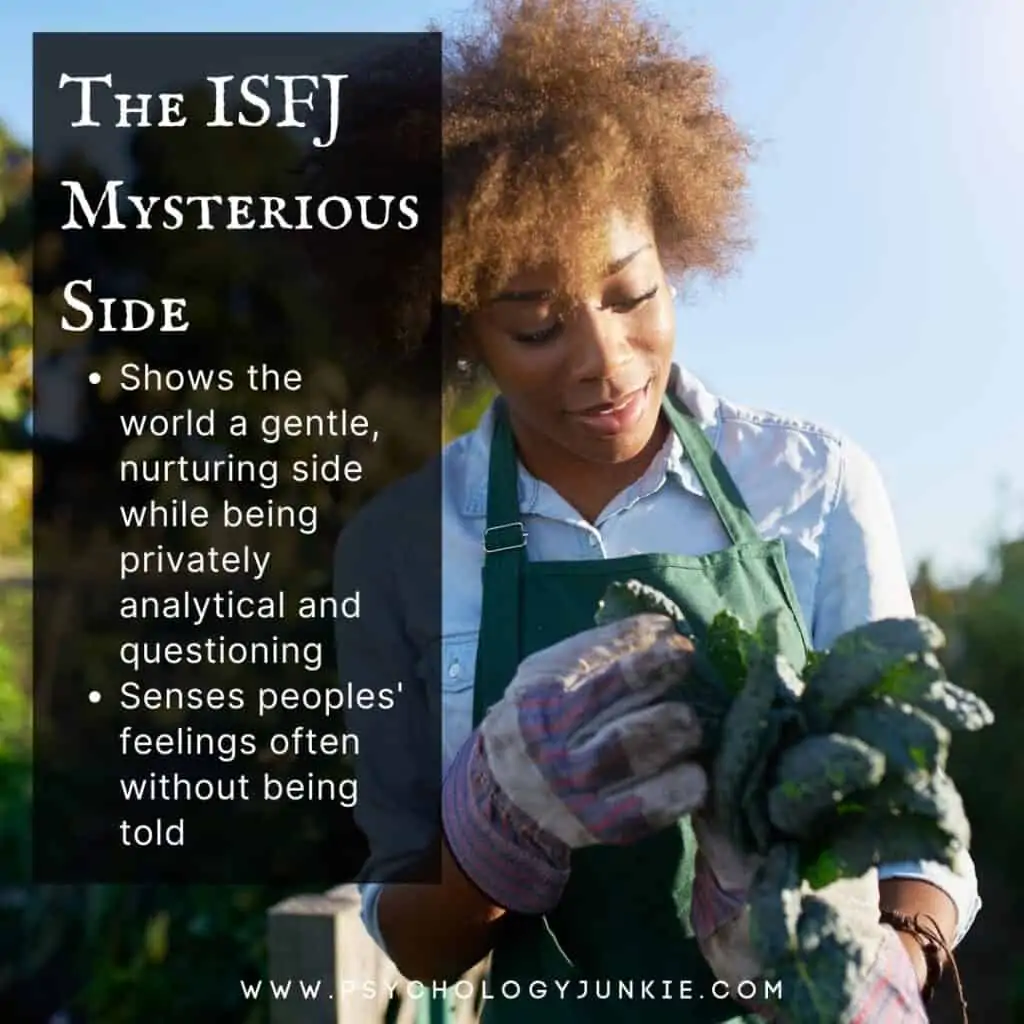
ISFJs have a quiet strength. They make you feel safe, welcome, remembered. They’re the ones noticing when you’re overwhelmed, when you skipped lunch, when you need a little extra grace.
But don’t reduce them to just being “helpful.”
ISFJs are thoughtful and complex. They carry entire timelines in their minds—memories, meanings, moments that left a mark. A falling leaf might take them back to childhood. An old photo might launch a whole inner monologue about life, change, and the passage of time.
They often keep their emotions to themselves—not because they don’t feel them, but because they don’t want to burden anyone. Beneath their calm, caretaking exterior is a deeply sensitive soul with rich insights and a streak of mystery.
If you take the time to know them, you’ll find someone who feels everything—and quietly treasures it all.
Read This Next: 24 Signs That You’re an ISFJ, the Protector Personality Type
The ISTJ
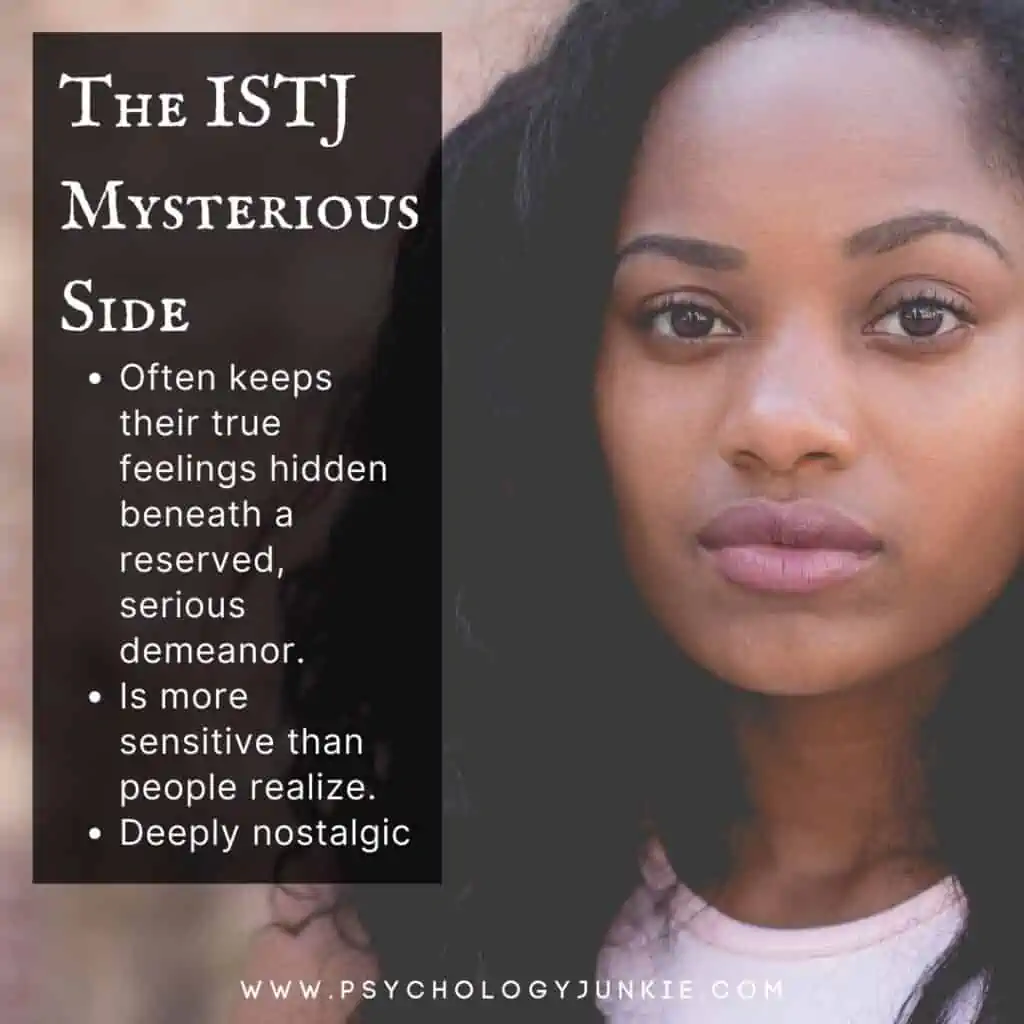
ISTJs are steady. Grounded. Reliable. They take their commitments seriously and show up when they say they will—usually early, and with a list.
You might know an ISTJ as the person who files taxes early, reads the fine print, and quietly saves the day without needing recognition.
But there’s more to them than logic and punctuality.
ISTJs often have a dry sense of humor that catches you off guard. Their jokes are clever, subtle, and timed just right. They also have a surprisingly rich inner world—full of ethical rules, insights, and emotions they rarely show.
Many ISTJs are secret romantics. They won’t say it out loud, but they’ll remember your favorite candy, the exact words you said three years ago, and the song that played on your first road trip together.
They don’t show their emotions easily—but that doesn’t mean they don’t feel them deeply.
Read This Next: 24 Signs That You’re an ISTJ, the Detective Personality Type
What Are Your Thoughts?
Did you enjoy this article? Did your section resonate with you? Let us and others know in the comments!
Next Steps…
If you want to go deeper into your personality’s wiring and what it all means, I put together a eBook that might feel like coming home.
And if you need help clarifying your personality type (or understanding it) I offer one-on-one type clarification sessions too.
Explore more about your personality type in our eBooks, Discovering You: Unlocking the Power of Personality Type, The INFJ – Understanding the Mystic, The INTJ – Understanding the Strategist, and The INFP – Understanding the Dreamer. You can also connect with me via Facebook, Instagram, YouTube, or Twitter!






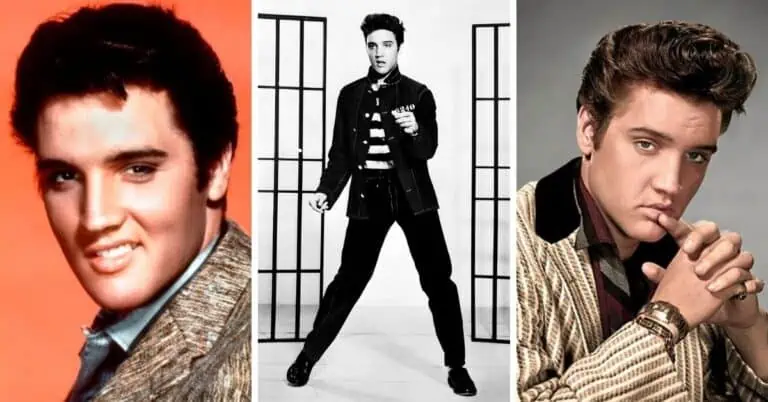


How do you come up with this stuff? I’m amazed that you know so much of me yet you don’t know me. To bad I didn’t know this in my younger years. Thanks
On the spot. At least I like to think that it is, being so rich in good values and rational virtues. Thank you. Rui
Am I incorrect here but is the Myer Briggs model not been debunked as its never actually been peer reviewed or scientifically tested I its original form??
Ps sorry for any typos, I’m not wearing g my glasses lol
„INFPs often have an aura of mystery. They might be quiet, reserved, or just lost in thought—but don’t mistake that for emptiness.“
Oftentimes, I do feel empty, though. But I guess that‘s not the same as being empty. I mean, I hope so. 🙂